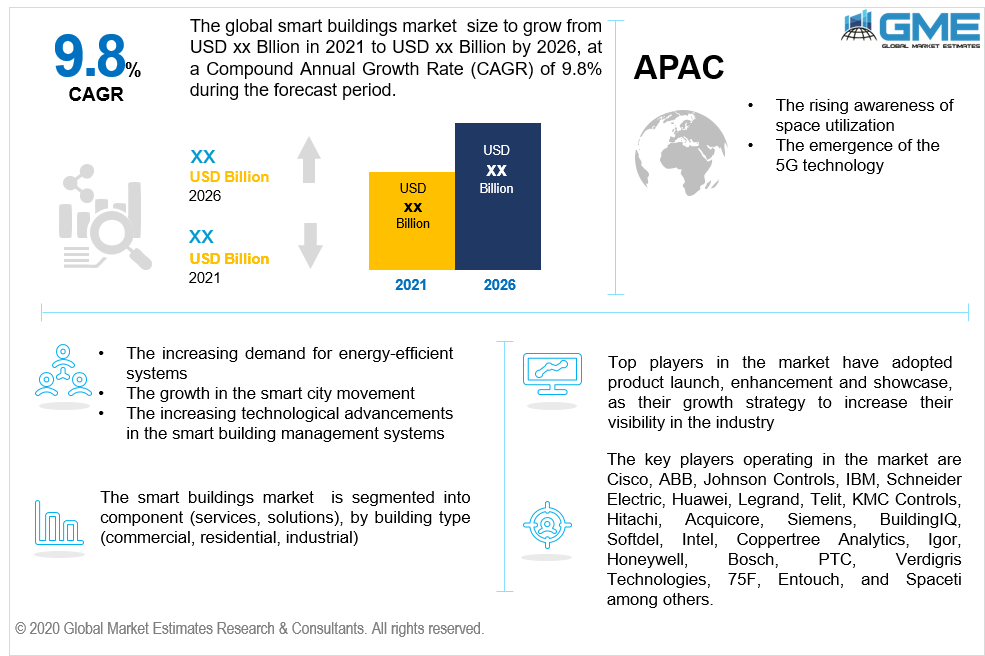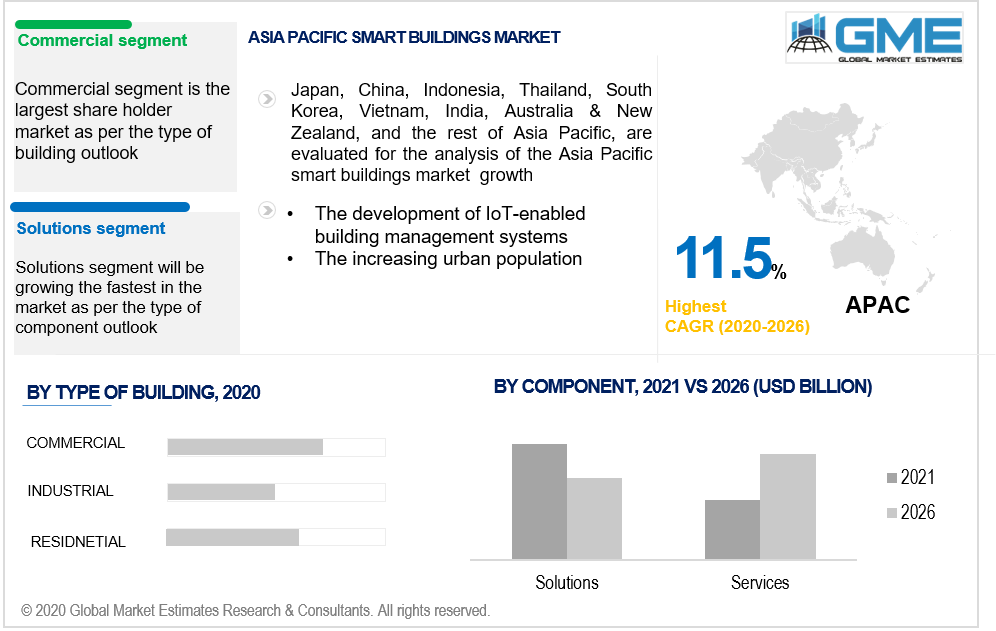
Global Smart Buildings Market Size, Trends, and Analysis- Forecasts To 2026 By Component (Services, Solutions), By Building Type (Commercial, Residential, Industrial), By Region (North America, Asia Pacific, CSA, Europe, and the Middle East and Africa); End-User Landscape, Company Market Share Analysis & Competitor Analysis
A smart commercial building automates the entire system of infrastructure, lighting, security systems, heating, ventilation, air conditioning systems. To make buildings more effective, sustainable, safer, and reduce expenses, smart building technology is implemented in developed countries. Building systems can be operated automatically according to environmental conditions, pre-set & variable conditions, and according emergency incidents. Energy efficiency remains at the forefront of IoT Smart Building trends. Growing awareness of space utilization and increasing demand for energy-efficient systems are expected to boost the growth during the projected timeline. It is also anticipated that increasing acceptance of IoT-enabled BMS would boost market demand for smart buildings. Furthermore, the growth in the smart city movement and the emergence of 5G technology have enabled the demand to expand rapidly from 2021 to 2026.

Solutions and services are the two components of the smart building market. The solutions segment is further segmented into building infrastructure management, energy management, safety and security management, integrated workplace management system, and network management. The energy management segment will grow the fastest over the expected timeframe with a high value of CAGR. Smart building energy management systems help to reduce and track the energy consumption of a building.
Based on the type of building, the market is described into three segments: commercial, industrial, and residential. The commercial segment is anticipated to be the largest market shareholder. This is attributed to the need for suitable and tailor-made energy-efficient solutions, to minimize energy consumption in buildings without sacrificing the comfort or safety of the building.

The North American region is expected to augment the highest revenue over the expected period from 2021 to 2026. This is due to the implementation of smart building technologies, technological developments in data analytics, deep analytics, and cloud computing, and minimizing greenhouse gas emissions. Moreover, In the Asia Pacific region, smart building solutions providers are working on developing IoT-enabled building management systems to boost smart building services, which will help the region grow the fastest in the market.
The major players competing in this market are Cisco, ABB, Johnson Controls, IBM, Schneider Electric, Huawei, Legrand, Telit, KMC Controls, Hitachi, Acquicore, Siemens, BuildingIQ, Softdel, Intel, Coppertree Analytics, Igor, Honeywell, Bosch, PTC, Verdigris Technologies, 75F, Entouch, and Spaceti, among others.
Please note: This is not an exhaustive list of companies profiled in the report.
In August 2019, Cisco successfully acquired Sentryo who is engaged in providing security solutions and device visibility for industrial control systems (ICS) networks.
We value your investment and offer free customization with every report to fulfil your exact research needs.
The Global Smart Buildings Market has been studied from the year 2019 till 2026. However, the CAGR provided in the report is from the year 2021 to 2026. The research methodology involved three stages: Desk research, Primary research, and Analysis & Output from the entire research process.

The desk research involved a robust background study which meant referring to paid and unpaid databases to understand the market dynamics; mapping contracts from press releases; identifying the key players in the market, studying their product portfolio, competition level, annual reports/SEC filings & investor presentations; and learning the demand and supply side analysis for the Smart Buildings Market.

The primary research activity included telephonic conversations with more than 50 tier 1 industry consultants, distributors, and end-use product manufacturers.

Finally, based on the above thorough research process, an in-depth analysis was carried out considering the following aspects: market attractiveness, current & future market trends, market share analysis, SWOT analysis of the companies and customer analytics.

Tailor made solutions just for you
80% of our clients seek made-to-order reports. How do you want us to tailor yours?
OUR CLIENTS